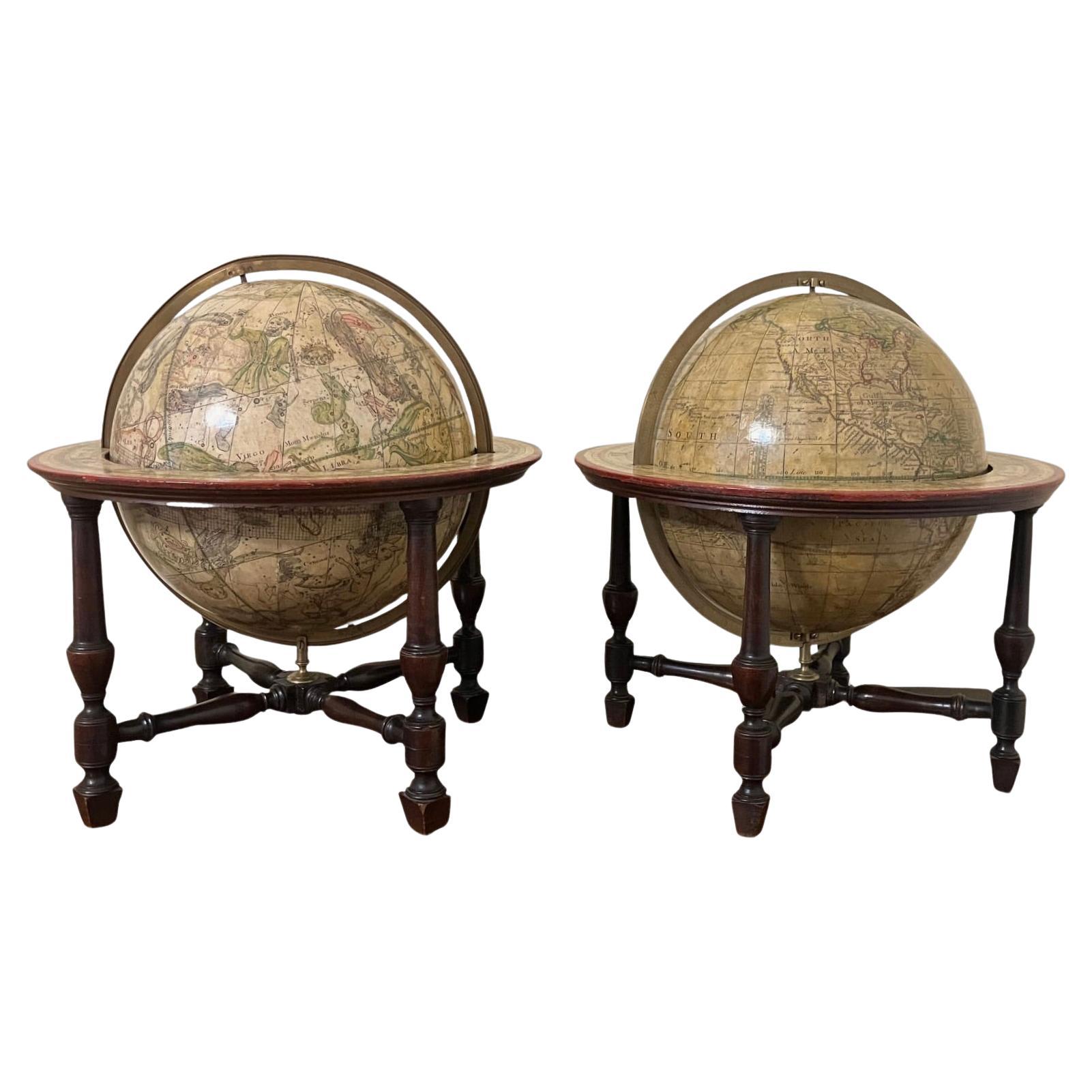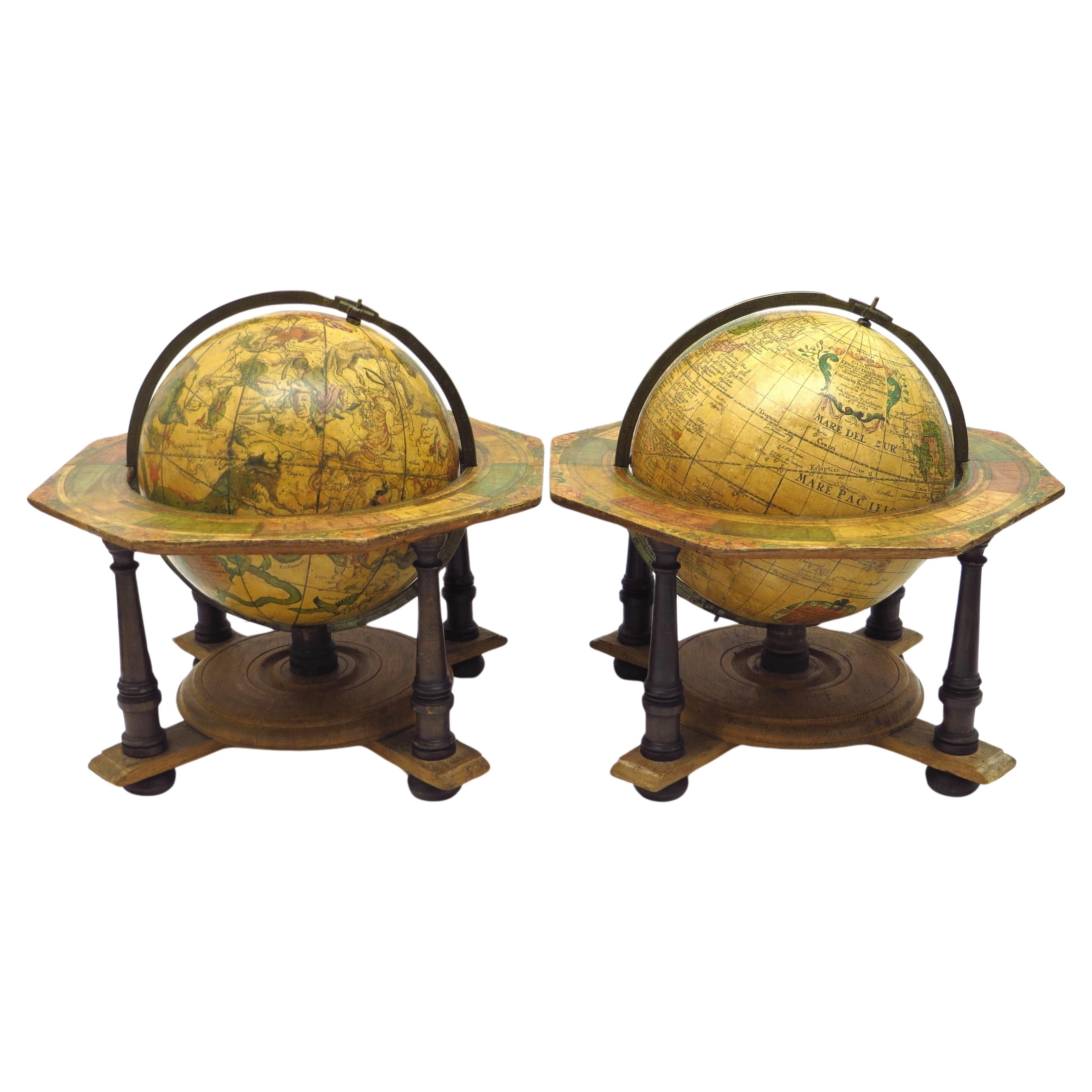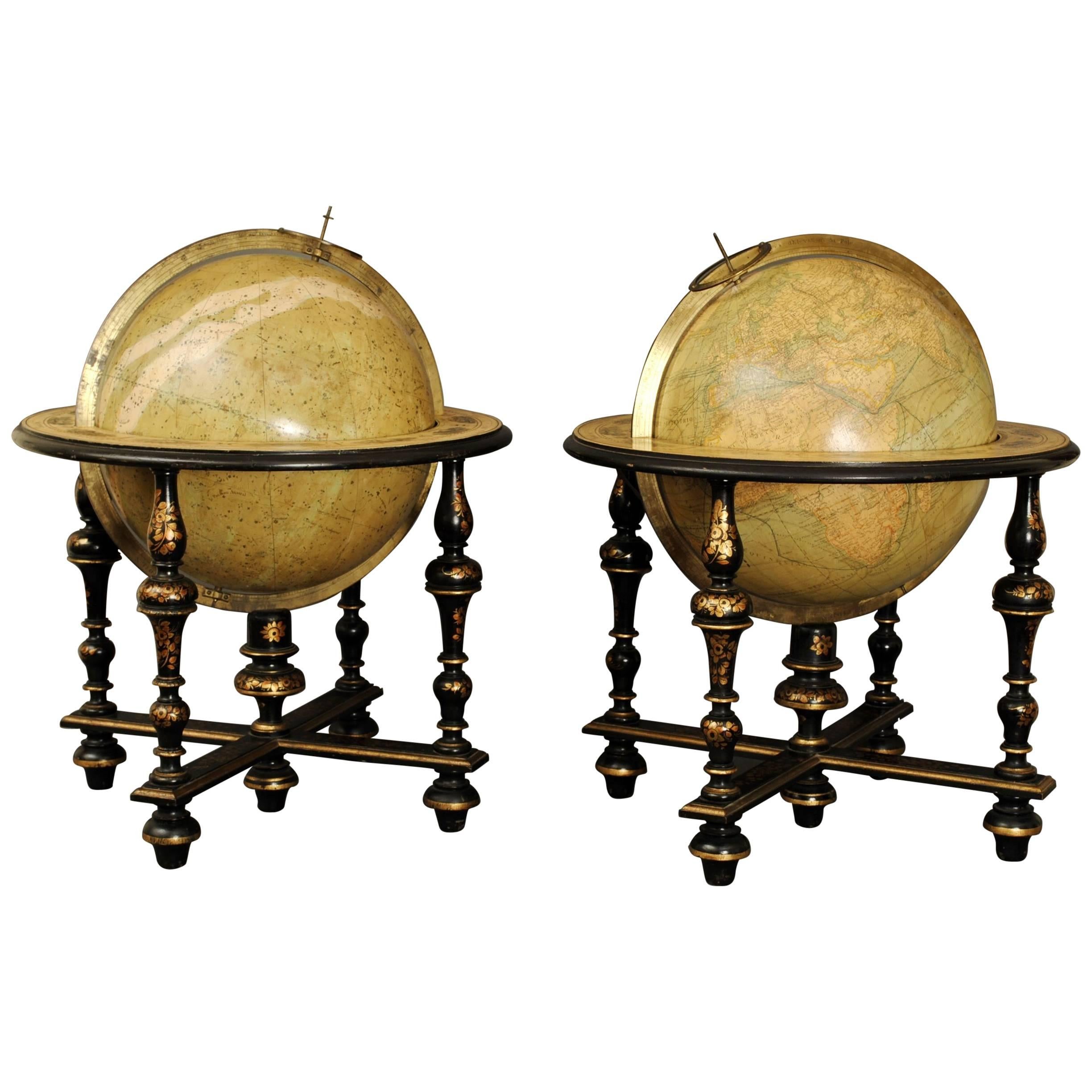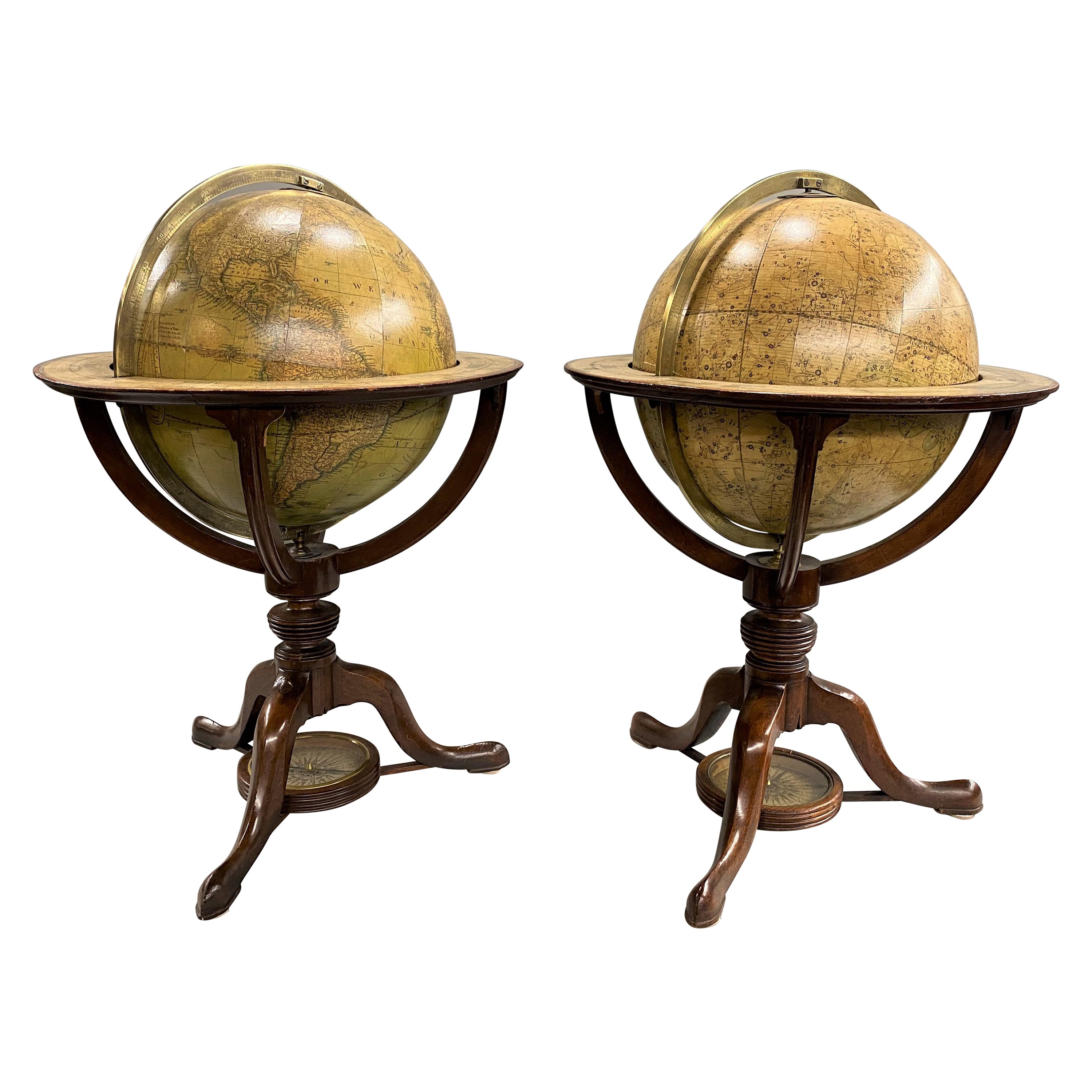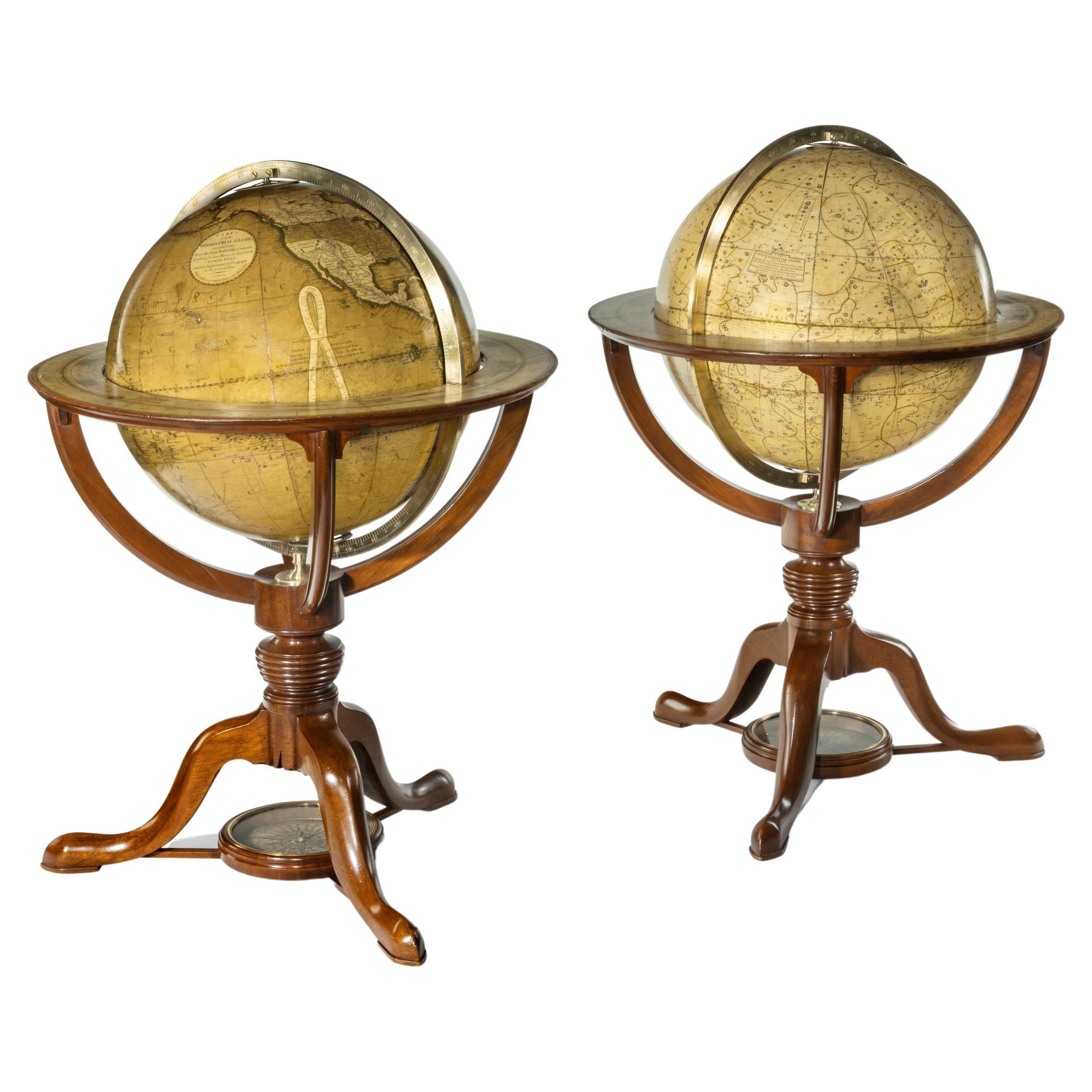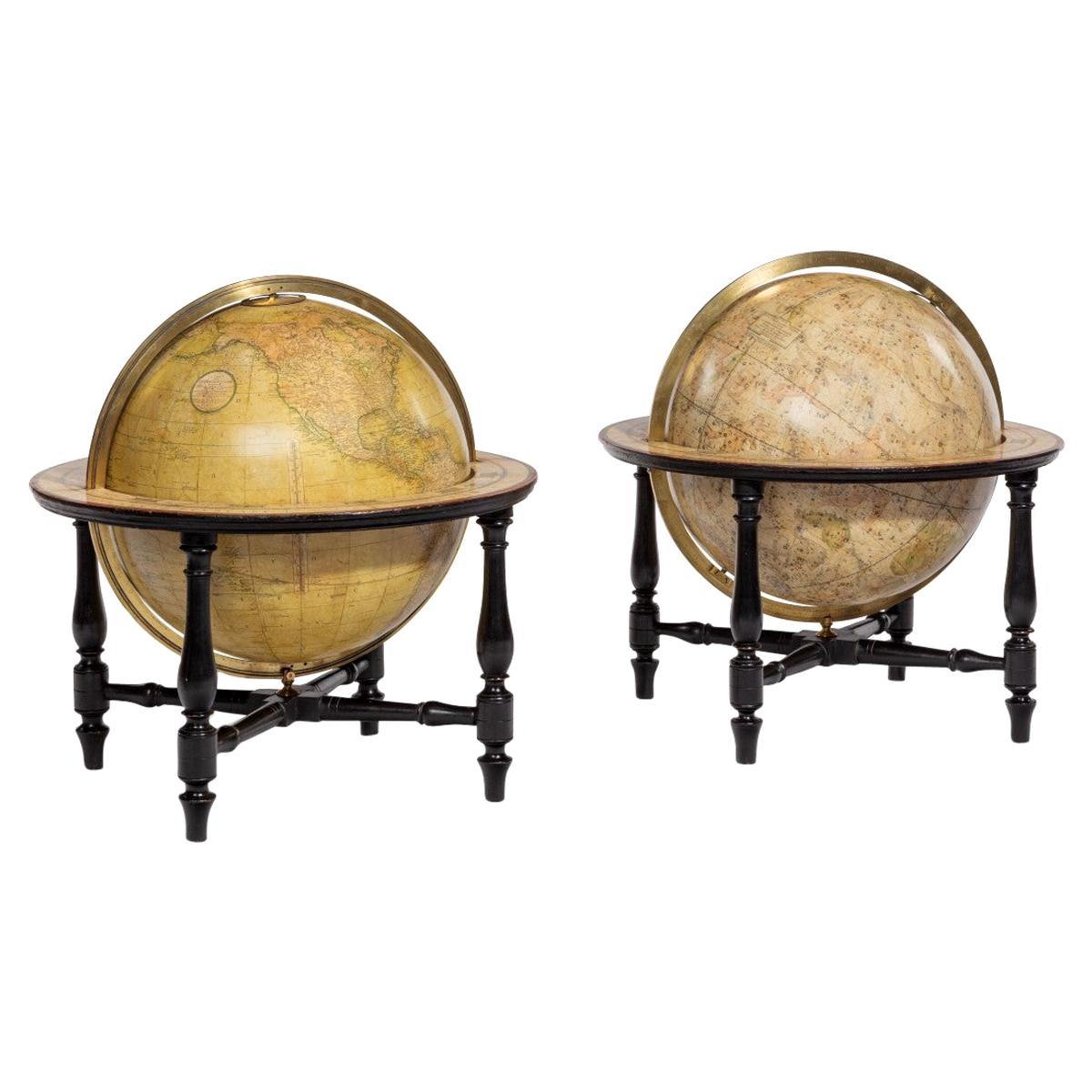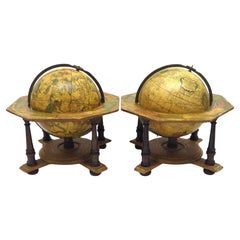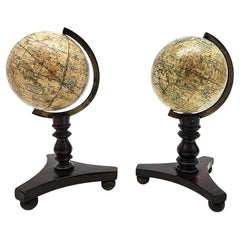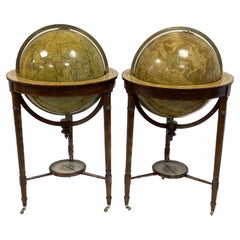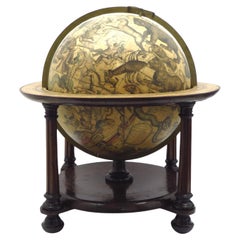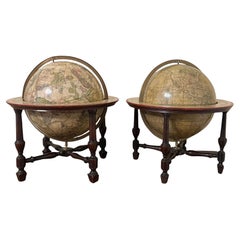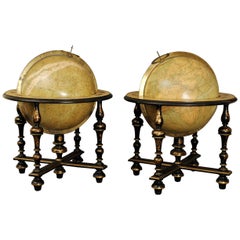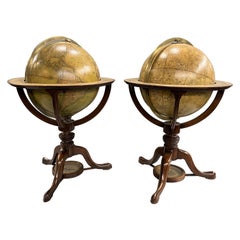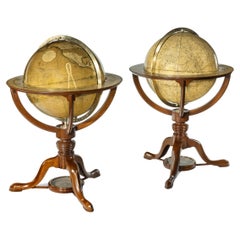Items Similar to A pair of extremely rare Valk table globes
Video Loading
Want more images or videos?
Request additional images or videos from the seller
1 of 13
A pair of extremely rare Valk table globes
$262,302.75per set
$327,878.43per set20% Off
£194,326.99per set
£242,908.74per set20% Off
€220,000per set
€275,000per set20% Off
CA$359,341.65per set
CA$449,177.06per set20% Off
A$398,719.85per set
A$498,399.81per set20% Off
CHF 208,858.04per set
CHF 261,072.55per set20% Off
MX$4,889,375.66per set
MX$6,111,719.58per set20% Off
NOK 2,656,602.22per set
NOK 3,320,752.78per set20% Off
SEK 2,507,719.18per set
SEK 3,134,648.98per set20% Off
DKK 1,673,491.53per set
DKK 2,091,864.41per set20% Off
Shipping
Retrieving quote...The 1stDibs Promise:
Authenticity Guarantee,
Money-Back Guarantee,
24-Hour Cancellation
About the Item
Title on the globes:
VALK, Gerard and Leonard. [Terrestrial globe:] Cosmotheore, caelesti nostro globo, par, et plane novus, hic terrestris ut existeret, certo scias, errore veterum sublato, non tantum utriusque orbis, longitudines ac latitudines, par reiterates neotericorum observationes, hicce esse restitutas, sed et nullum typis emendatiorem prodiisse, hoc igitur novissimô tam diu fruere, donec sub majori forma, meô aere alios excudam Gerardus Valk calcographus, Amsterdami, A[nn]o 17[50] cum privilegio. Amsterdam, [Maria Schenk, widow of Leonard Valk], 17[50]. And: [Celestial globe:] Uranographia, caelum omne hie complectens, illa pro ut aucta, et ad annum 1700 competum, magno ab hevelio, correcta est, ita, ejus ex prototypis, sua noviter haec ectypa, veris astronomiae cultoribus, exhibit et consecrate, Ger. et Leon. Valk, Amstelaedamenses. Amsterdam, Gerard and Leonard Valk, [ca. 1711].
A pair of rare Valk table globes published by Gerard and Leonard Valk at Amsterdam ca. 1711 and their heirs in 1750.
The Dutch globe makers Gerard Valk (1652–1726) and his son Leonard Valk (1675–1746) were the most important, indeed the only significant, publishers of globes in the Netherlands in the eighteenth century. The design of their globes was completely new and incorporated the latest geographical and astronomical discoveries, making them the most accurate globes of their time.
Valk completed his present 15 inch (39 cm) globes in 1707 and the copper plates went through several states over the years. The terrestrial globe is here in what Van der Krogt calls state 3 (with the date changed to 1750 by pasting a slip over the “45” of the “1745” in state 2). Leonard Valk made the most important revision to the 1707 topographic image sometime between 1730 and 1745 when he revised the Caspian Sea and Aral Sea based on a new mapping. The celestial globe, is in state 2 (as published ca. 1711, when Leonard’s name was added to his father’s, but it was not further revised until 1745). The Valks apparently numbered each globe they made, stamping the number on the back of the brass meridian ring near the north pole and beginning a new series when the plate was revised.
The present terrestrial globe is numbered “3”; the meridian ring of the celestial globe is not original and bears no number. They apparently made very few of these globes, for in the present states Van der Krogt records no numbers higher than 10 for the terrestrial globe or 7 for the globe. By contrast, for the 12 inch celestrial globe in state 2 he records a globe number 45 and for several others he records numbers in the 20s and 30s.
The present pair form a beautiful example of the outstanding work of the Dutch Valk family as globe makers. Each globe made up of two hollow paper-maché hemispheres joined at the equator and covered with a layer of plaster, the whole covered with eighteen engraved gores and two polar calottes, the celestial calottes on the ecliptic poles. The equator is graduated in individual degrees, the ecliptic in individual days of the houses of the Zodiac with sigils. Each globe has a brass meridian ring and hour dial with a hand-coloured printed paper ring on the wooden horizon ring, showing degrees and the days of the houses of the Zodiac.
Each globe supported by four columns with bun feet on a Dutch-style oak stand connected by cross-stretchers supporting a circular base plate, with a support for the meridian ring at its centre. Including the oak stand, each globe has a height of 59 cm (23 inches). The last two digits of the year on the terrestrial globe have been nearly obliterated, but one can see that they were formerly covered with a slip, as expected in state 3. Both stands are new and the celestial globe has a later hour dial and brass meridian ring and its paper horizon ring is in facsimile. Some minor paper repairs in Ethiopia (terrestrial globe) have been professionally restored. Overall in good condition. An extraordinary, eye-catching set of these rare globes.
Van der Krogt, Globi Neerlandici, pp. 313–331, 555–557, globes VAL III T state 3 (4 copies: numbered 2, 4, 8 & 10) & VAL III C state 2 (4 copies, numbered 2, 6, 7 & one unnumbered).
- Creator:Gerard and Leonard Valk (Designer)
- Dimensions:Height: 23 in (58.42 cm)Diameter: 15 in (38.1 cm)
- Sold As:Set of 2
- Style:Dutch Colonial (Of the Period)
- Materials and Techniques:
- Place of Origin:
- Period:
- Date of Manufacture:1700/1750
- Condition:Replacements made: The celestial globe has a new stand, a later hour dial and brass meridian ring and its paper horizon ring is in facsimile. Some minor paper repairs in Ethiopia (terrestrial globe) have been professionally restored. Wear consistent with age and use. Overall in good condition. An extraordinary, eye-catching set of these rare globes.
- Seller Location:ZWIJNDRECHT, NL
- Reference Number:Seller: Jacob B. de Roo, The Netherlands, Antiquarian since 20041stDibs: LU9419237295392
About the Seller
No Reviews Yet
Vetted Professional Seller
Every seller passes strict standards for authenticity and reliability
Established in 2004
1stDibs seller since 2023
- ShippingRetrieving quote...Shipping from: ZWIJNDRECHT, Netherlands
- Return Policy
Authenticity Guarantee
In the unlikely event there’s an issue with an item’s authenticity, contact us within 1 year for a full refund. DetailsMoney-Back Guarantee
If your item is not as described, is damaged in transit, or does not arrive, contact us within 7 days for a full refund. Details24-Hour Cancellation
You have a 24-hour grace period in which to reconsider your purchase, with no questions asked.Vetted Professional Sellers
Our world-class sellers must adhere to strict standards for service and quality, maintaining the integrity of our listings.Price-Match Guarantee
If you find that a seller listed the same item for a lower price elsewhere, we’ll match it.Trusted Global Delivery
Our best-in-class carrier network provides specialized shipping options worldwide, including custom delivery.More From This Seller
View AllA decorative pair of rare table globes in a fine condition.
By Johann Gabriel Doppelmayr
Located in ZWIJNDRECHT, NL
These pair of globes, dated 1730, are original and in fine condition.
Title:
Globus terrestris novus Loca Terrae insigniora sec. praestant Astron. et Geogr. observationes sistens op...
Category
Antique Early 18th Century German Baroque Globes
Materials
Other
Lovely pair of English miniature globes on carved wooden stands
By Newton and Son
Located in ZWIJNDRECHT, NL
“NEWTON’S NEW & IMPROVED TERRESTRIAL and CELESTIAL GLOBES".
PUBLISHED BY NEWTON & SON,
66 CHANCERY LANE, LONDON.”
No date but ca. 1820-1830.
Diameter globes 2.75 inches / Total heig...
Category
Antique 1820s British Victorian Globes
Materials
Wood
A huge pair of 21 inches Cruchley Library Globes
By G.F. Cruchley
Located in ZWIJNDRECHT, NL
G.F. Cruchley (UK, 1796-1880)
London ca 1850
A magnificent pair of terrestrial and celestial globes. Equatorial table engraved with the signs of the zodiac and resting on 3 mahogany molded feet held by a compass at the spacer. With graduated brass meridian circles and time clocks. The terrestrial globe is inscribed in a cartouche: Cruchley's new terrestrial globe from the most recent and best authorities. Exhibiting the discoveries in equatorial Africa, north pole. And the new settlements and divisions in Australia, New Zealand, Californa, Texas, &c. London. Sold by Gould and Porter opticians 181 strand WC. The celestial globe is inscribed in a cartouche: Cruchleys new celestial globe on which is accurately laid down the whole of the stars and nebule contained in the astronomical catalogue of the Reverend Mr. Wollaston F.R.S. Also from the authorities Flamstead, De La Caille, Hevellus, Bradley, Herschel, Maskelyne, &c. Ands the limits of each constellation determined by a boundary line. London, published by G.F. Cruchley, map-seller & globe maker, 81 Fleet street.
Signed: CRUCHLEY in London England, circa 1850 H. 125 cm Diam. 53 cm (21 inches) Diam. 25 cm compasses The two spheres are in a perfect state of freshness and are perfectly legible.
The condition of both the globes is very good. There have been some professional repairs to some damaged gores. The Terrestrial globe in good conserved and legible condition, it has areas of rubbing, retouching, and slight discoloration. The Celestial globe is also in good conserved and legible condition with areas of rubbing, retouching and slight discoloration. The gores themselves have been cleaned and revarnished. The splendid mahogany legs and moulded feet are in first class condition. Each globe consists of 12 hand coloured copper engraved gores over a paper-maché hollow core, made up of two hemispheres joined at the equator and covered with a layer of plaster. There are paper horizon rings, made up of a series of concentric circles, displaying the months of the year, the signs of the zodiac and wind directions.
THE TERRESTRIAL GLOBE.
The globe provides much detailed information, and was accurate up to the date of production, which in this case is the mid-19th century. It shows the latest discoveries and developments that had taken place. It displays names and territories that were once familiar to the people of the age, 150 years into the future! In Asia for example, there are places like ‘Little Bucharia’, ‘Little and Greater Tartary’, ‘Russia in Asia.’ Undoubtedly, the continent that has changed more than any other is Africa. So many African countries that we know and recognise now, had different, perhaps more ‘Colonial’ names more than a century and a half ago. There was ‘Nubia’ (Sudan/Egypt), ‘Abbyssinia’ (Ethiopia), ‘Cape Colony’ (South Africa), ‘Dahomey’ (Benin) but to name a few. Australia was a little over 50 years away from its union via ‘Federation’ in 1901. This brought about the Commonwealth of Australia. However, in 1850 they were six separate British selfserving colonies, ruled directly from England.
In North America, both Los Angeles and San Francisco are incorporated as cities into California - as it becomes the 31st U.S. state. Much of mid-western and western USA were known as ‘The Western Territory’ & ‘The Missouri Territory’, Florida was still refered to as ‘East & West Florida’. Canada was split into ‘Canada East’ & ‘Canada West.’ Canada East was primarily (for historical reasons) French-speaking, and Canada West primarily Englishspeaking. Much of Western Canada remained unexplored and undeveloped. In Europe, there was still the ‘Russian Empire’, the ‘Ottoman Empire’, the ‘AustroHungarian Empire’, and the German ‘Prussian Empire.’
THE CELESTIAL GLOBE.
The Celestial Globe displays the stars, the constellations, clusters and nebulae in a beautiful and well thought out manner. Mythical figures and signs of the zodiac are seen. The equinoctial and solistitial colures are graduated in degrees. Although the colour is somewhat muted, it takes nothing away from the overall beauty and the undoubted aesthetic qualities of the globe.
Historically, globes are among the most ancient scientific instruments known to man. They can be dated back over two millennia, and are still manufactured to this day. The earliest tradition of globe making is mainly concerned with celestial globes – man...
Category
Antique 1850s British Victorian Globes
Materials
Other
A beautiful Celestial Table Globe produced by Gerard & Leonard Valk
By Gerard and Leonard Valk
Located in ZWIJNDRECHT, NL
A magnificent and very rare early 18th century celestial table globe produced by Gerard and Leonard Valk. Established at the end of the previous ...
Category
Antique Early 18th Century Dutch Dutch Colonial Globes
Materials
Other
$190,765 Sale Price
20% Off
Free Shipping
A fine pair of miniature globes on stands
By Karl Muller
Located in ZWIJNDRECHT, NL
A rare pair of miniature terrestrial and celestial globes.
by K. Müller, 1822
Karlsruhe, Germany
Diameter globes: 7 cm. Total high: 14,5 cm.
Each with 12 hand-coloured engraved p...
Category
Antique Early 19th Century German International Style Globes
Materials
Hardwood, Paper
An English POCKET GLOBE with dial for time zones
By Newton and Son
Located in ZWIJNDRECHT, NL
NEWTON & SON (fl.1840-61)
AN ENGLISH POCKET GLOBE WITH A DIAL FOR TIME ZONES, CIRCA 1835
A previously unrecorded stand for an early-19th-century English globe.
A 3-inch (7.6cm.) di...
Category
Antique 1830s British Other Globes
Materials
Mahogany
You May Also Like
A Pair of English 9-Inch Terrestrial and Celestial Table Globes by Wm. Bardin
Located in San Francisco, CA
A fine pair of English 9" terrestrial and celestial globes, each with engraved meridian rings, resting in mahogany stands with turned stretchers, both signed by the maker Wm. Bardin ...
Category
Antique Late 18th Century English George III Globes
Materials
Mahogany, Paper
Superb Pair of Delamarche Table Globes
Located in Lincolnshire, GB
A wonderful pair of 19th century table globes by Mansion Delamarche Paris, in superb original condition. The 12" globes in the original lacquered and gilt decorated stands.
Category
Antique 1860s French Globes
$40,615 / set
Pair of Early 19th Century English Cary Terrestrial/Celestial Table Model Globes
By John & William Cary, George & John Cary
Located in Milford, NH
A fine pair of 12-inch English table model globes on stands, manufactured by G.& J. Cary, the left globe with cartouche labeled “Carey’s New Terrestrial Globe, delineated from the be...
Category
Antique Early 19th Century English Globes
Materials
Brass
Pair of Table Globes by G & J Cary, Dated 1800 and 1821
By George & John Cary
Located in Lymington, Hampshire
A pair of 12 inch table globes by G & J Cary, dated 1800 and 1821, each with hand-painted gores, set in mahogany stands with a turned support raised on t...
Category
Antique Early 19th Century English Globes
Materials
Mahogany
Pair of Cary’s Table Globes
Located in Lymington, Hampshire
A pair of Cary’s 15-inch table globes, each set into an ebony stand with four turned legs and stretchers, the terrestrial stating “Cary’s New Terrestrial Globe exhibiting the tracks ...
Category
Antique Early 1800s English Globes
Materials
Ebony
$29,945
Pair of Early 19th C Cary Celestial & Terrestrial Tabletop Globes
By John & William Cary, George & John Cary
Located in Milford, NH
A fine pair of tabletop globes on stands, the left hand colored Celestial globe with cartouche which reads “Cary's New Celestial Globe on which are corr...
Category
Antique Early 19th Century English Globes
Materials
Mahogany
